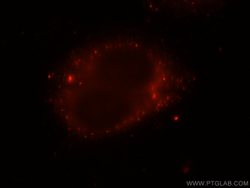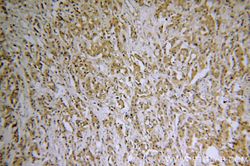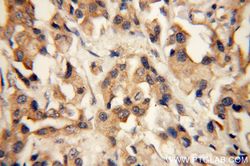Antibody data
- Antibody Data
- Antigen structure
- References [14]
- Comments [0]
- Validations
- Western blot [1]
- Immunocytochemistry [1]
- Immunohistochemistry [2]
Submit
Validation data
Reference
Comment
Report error
- Product number
- 18976-1-AP - Provider product page

- Provider
- Proteintech Group
- Proper citation
- Proteintech Cat#18976-1-AP, RRID:AB_10598319
- Product name
- SH3PXD2A antibody
- Antibody type
- Polyclonal
- Description
- KD/KO validated SH3PXD2A antibody (Cat. #18976-1-AP) is a rabbit polyclonal antibody that shows reactivity with human, mouse, rat and has been validated for the following applications: IF, IHC, WB,ELISA.
- Reactivity
- Human, Mouse, Rat
- Host
- Rabbit
- Conjugate
- Unconjugated
- Isotype
- IgG
- Vial size
- 20ul, 150ul
Submitted references Expression of non-phosphorylatable S5A-L-plastin exerts phenotypes distinct from L-plastin deficiency during podosome formation and phagocytosis.
Fiber Microarchitecture in Interpenetrating Collagen-Alginate Hydrogel with Tunable Mechanical Plasticity Regulates Tumor Cell Migration.
Starvation-inactivated MTOR triggers cell migration via a ULK1-SH3PXD2A/TKS5-MMP14 pathway in ovarian carcinoma.
An oncogenic isoform of septin 9 promotes the formation of juxtanuclear invadopodia by reducing nuclear deformability.
Tumour: Fibroblast Interactions Promote Invadopodia-Mediated Migration and Invasion in Oral Squamous Cell Carcinoma.
Gab1 regulates invadopodia and autocrine VEGF through SHP2/ERK1/2 in hilar cholangiocarcinoma cells.
The clinicopathologic significance of Tks5 expression of peritoneal mesothelial cells in gastric cancer patients.
IKKε phosphorylates kindlin-2 to induce invadopodia formation and promote colorectal cancer metastasis.
Association of lncRNA SH3PXD2A-AS1 with preeclampsia and its function in invasion and migration of placental trophoblast cells.
Cytoplasmic LIF reprograms invasive mode to enhance NPC dissemination through modulating YAP1-FAK/PXN signaling.
Inhibition of KLF5-Myo9b-RhoA Pathway-Mediated Podosome Formation in Macrophages Ameliorates Abdominal Aortic Aneurysm.
The role of Tks adaptor proteins in invadopodia formation, growth and metastasis of melanoma.
The invadopodia scaffold protein Tks5 is required for the growth of human breast cancer cells in vitro and in vivo.
Src-dependent Tks5 phosphorylation regulates invadopodia-associated invasion in prostate cancer cells.
Lin X, Krishnamoorthy P, Walker EC, Joshi H, Morley SC
Frontiers in cell and developmental biology 2023;11:1020091
Frontiers in cell and developmental biology 2023;11:1020091
Fiber Microarchitecture in Interpenetrating Collagen-Alginate Hydrogel with Tunable Mechanical Plasticity Regulates Tumor Cell Migration.
Wei Z, Liu J, Jia Y, Lei M, Zhang S, Xi P, Ma Y, Zhang M, Ma J, Wang L, Guo H, Xu F
Advanced healthcare materials 2023 Nov;12(29):e2301586
Advanced healthcare materials 2023 Nov;12(29):e2301586
Starvation-inactivated MTOR triggers cell migration via a ULK1-SH3PXD2A/TKS5-MMP14 pathway in ovarian carcinoma.
Lin CY, Wu KY, Chi LM, Tang YH, Huang HJ, Lai CH, Tsai CN, Tsai CL
Autophagy 2023 Dec;19(12):3151-3168
Autophagy 2023 Dec;19(12):3151-3168
An oncogenic isoform of septin 9 promotes the formation of juxtanuclear invadopodia by reducing nuclear deformability.
Okletey J, Angelis D, Jones TM, Montagna C, Spiliotis ET
Cell reports 2023 Aug 29;42(8):112893
Cell reports 2023 Aug 29;42(8):112893
Tumour: Fibroblast Interactions Promote Invadopodia-Mediated Migration and Invasion in Oral Squamous Cell Carcinoma.
Kato K, Miyazawa H, Kawashiri S, Lambert DW
Journal of oncology 2022;2022:5277440
Journal of oncology 2022;2022:5277440
Gab1 regulates invadopodia and autocrine VEGF through SHP2/ERK1/2 in hilar cholangiocarcinoma cells.
Li T, Tian Y, Ren W, Chen P, Luo M, Sang H
American journal of translational research 2022;14(12):8934-8946
American journal of translational research 2022;14(12):8934-8946
The clinicopathologic significance of Tks5 expression of peritoneal mesothelial cells in gastric cancer patients.
Sugimoto A, Okuno T, Tsujio G, Sera T, Yamamoto Y, Maruo K, Kushiyama S, Nishimura S, Kuroda K, Togano S, Miki Y, Yoshii M, Tamura T, Toyokawa T, Tanaka H, Muguruma K, Ohira M, Yashiro M
PloS one 2021;16(7):e0253702
PloS one 2021;16(7):e0253702
IKKε phosphorylates kindlin-2 to induce invadopodia formation and promote colorectal cancer metastasis.
Liu G, Bao Y, Liu C, Zhu Q, Zhao L, Lu X, Zhu Q, Lv Y, Bai F, Wen H, Sun Y, Zhu WG
Theranostics 2020;10(5):2358-2373
Theranostics 2020;10(5):2358-2373
Association of lncRNA SH3PXD2A-AS1 with preeclampsia and its function in invasion and migration of placental trophoblast cells.
Chen Q, Jiang S, Liu H, Gao Y, Yang X, Ren Z, Gao Y, Xiao L, Hu H, Yu Y, Yang X, Zhong M
Cell death & disease 2020 Jul 27;11(7):583
Cell death & disease 2020 Jul 27;11(7):583
Cytoplasmic LIF reprograms invasive mode to enhance NPC dissemination through modulating YAP1-FAK/PXN signaling.
Liu SC, Hsu T, Chang YS, Chung AK, Jiang SS, OuYang CN, Yuh CH, Hsueh C, Liu YP, Tsang NM
Nature communications 2018 Nov 30;9(1):5105
Nature communications 2018 Nov 30;9(1):5105
Inhibition of KLF5-Myo9b-RhoA Pathway-Mediated Podosome Formation in Macrophages Ameliorates Abdominal Aortic Aneurysm.
Ma D, Zheng B, Suzuki T, Zhang R, Jiang C, Bai D, Yin W, Yang Z, Zhang X, Hou L, Zhan H, Wen JK
Circulation research 2017 Mar 3;120(5):799-815
Circulation research 2017 Mar 3;120(5):799-815
The role of Tks adaptor proteins in invadopodia formation, growth and metastasis of melanoma.
Iizuka S, Abdullah C, Buschman MD, Diaz B, Courtneidge SA
Oncotarget 2016 Nov 29;7(48):78473-78486
Oncotarget 2016 Nov 29;7(48):78473-78486
The invadopodia scaffold protein Tks5 is required for the growth of human breast cancer cells in vitro and in vivo.
Blouw B, Patel M, Iizuka S, Abdullah C, You WK, Huang X, Li JL, Diaz B, Stallcup WB, Courtneidge SA
PloS one 2015;10(3):e0121003
PloS one 2015;10(3):e0121003
Src-dependent Tks5 phosphorylation regulates invadopodia-associated invasion in prostate cancer cells.
Burger KL, Learman BS, Boucherle AK, Sirintrapun SJ, Isom S, Díaz B, Courtneidge SA, Seals DF
The Prostate 2014 Feb;74(2):134-48
The Prostate 2014 Feb;74(2):134-48
No comments: Submit comment
Supportive validation
- Submitted by
- Proteintech Group (provider)
- Main image

- Experimental details
- HeLa cells were subjected to SDS PAGE followed by western blot with 18976-1-AP(SH3PXD2A antibody) at dilution of 1:500
- Sample type
- cell line
Supportive validation
- Submitted by
- Proteintech Group (provider)
- Main image

- Experimental details
- The SH3PXD2A antibody from Proteintech is a rabbit polyclonal antibody to a peptide of human SH3PXD2A. This antibody recognizes human,mouse,rat antigen. The SH3PXD2A antibody has been validated for the following applications: ELISA, WB, IHC, IF analysis.
Supportive validation
- Submitted by
- Proteintech Group (provider)
- Main image

- Experimental details
- Immunohistochemical of paraffin-embedded human breast cancer using 18976-1-AP(SH3PXD2A antibody) at dilution of 1:50 (under 10x lens)
- Sample type
- tissue
- Submitted by
- Proteintech Group (provider)
- Main image

- Experimental details
- Immunohistochemical of paraffin-embedded human breast cancer using 18976-1-AP(SH3PXD2A antibody) at dilution of 1:50 (under 40x lens)
- Sample type
- tissue
 Explore
Explore Validate
Validate Learn
Learn Western blot
Western blot ELISA
ELISA